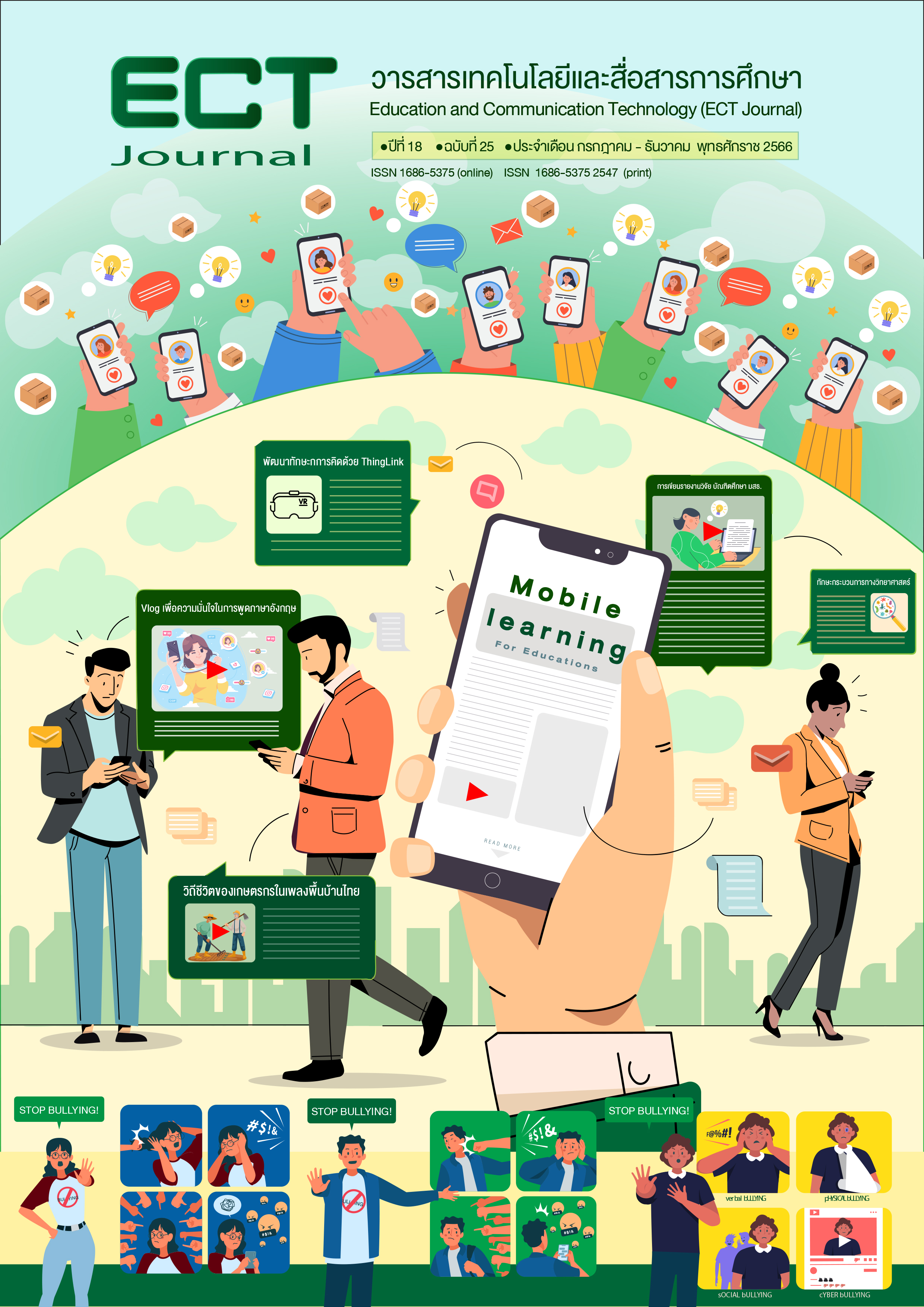The Development of Electronic Online Lessons on the Topic of Research Report Writing for Graduate Students at Sukhothai Thammathirat Open University
Keywords:
Electronic Online Lessons, The Writing for Research Report, Graduate StudiesAbstract
The purposes of this research were to (1) development anelectronic online lessons on the topic of the writing for research reportfor graduatestudents, Sukhothai Thammathirat Open University an efficiency standard (2) study the learning progress of students who learned from the electronic online lessons on the topic of the writing for research report; and (3) study the opinions of students who learned from the electronic online lessons on the topic of the writing for research report.The reseach sample comprised graduate students, Sukhothai Thammathirat Open University 39 students, obtained by simple random sampling. The employed research instruments comprised (1) an electronic online lessons on the topic of the writing for research report; (2) two parallel forms of an achievement test for pre-testing and post-testing; and (3) a questionnaire on student’s opinions toward the electronic online lessons on the topic of the writing for research report. Statistics for data analysis were the E1/E2efficiency index, mean, standard deviation, and t-test. Research findings showed that (1) the developed electronic online lessons on the topic of the writing for research report was efficient at 81.78/80.67, thus meeting the set efficiency criterion of 80/80; (2) the students who learned from the electronic online lessons on the topic of the writing for research report achieved learning progress significantly at the .05 level; and (3) the students had opinions that the electronic online lessons on the topic of the writing for research report was appropriate at the highest level
References
เกียรติพงษ์ อุดมธนะธีระ. (2563, 28 เมษายน). ประโยชน์ของการเรียนรู้โดยใช้สื่ออิเล็กทรอนิกส์. IOK2U. https://www.iok2u.com/article/information-technology/e-learning-e-learning-benefit
คณารักษ์ ศรีสมบูรณ์. (2563). การพัฒนาบทเรียนอิเล็กทรอนิกส์ รายวิชามนุษย์กับสิ่งแวดล้อมสำหรับนักศึกษาระดับปริญญาบัณฑิต. วารสารสังคมศาสตร์วิจัย, 11(2), 127-146. http://dept.npru.ac.th/jssr/data/files/11.2jssr8.pdf
เชน ชวนชม. (2561). การพัฒนาบทเรียนออนไลน์ วิชาเทคโนโลยีสารสนเทศในชีวิตประจำวัน เรื่องการใช้งานโปรแกรม Microsoft Office สำหรับนิสิตระดับปริญญาตรี ชั้นปีที่ 1 มหาวิทยาลัยบูรพา. วารสารวิชาการสถาบันการพลศึกษา, 10(3), 195-206.
นิกร จันภิลม, ชนะ เนตรภักดี, เอกวัฒน์ นิลม้าย, และทวีศักดิ์ สว่างเมฆ. (2562). เทคโนโลยีการศึกษาในยุค Thailand 4.0. วารสารปัญญาภิวัฒน์, 11(1), 304-314. https://so05.tci-thaijo.org/index.php/pimjournal/article/view/186303
มนต์ชัย เทียนทอง. (2554). การออกแบบและพัฒนาบทเรียนคอมพิวเตอร์. ศูนย์ผลิตตำราเรียน สถาบันเทคโนโลยีพระจอมเกล้าพระนครเหนือ.
มนัญชยา เรืองวงศ์โรจน์. (2560). การพัฒนาบทเรียนอิเล็กทรอนิกส์เพื่อการทบทวน รายวิชาการบริหารทรัพยากรมนุษย์ สำหรับนักศึกษาระดับอนุปริญญา วิทยาลัยชุมชนสมุทรสาคร. Veridian E-Journal, Silpakorn University ฉบับภาษาไทย สาขามนุษยศาสตร์ สังคมศาสตร์ และศิลปะ, 10(2), 1301-1316. https://he02.tci-thaijo.org/index.php/Veridian-E-Journal/article/view/98291
มหาวิทยาลัยสุโขทัยธรรมาธิราช. (2560). คู่มืออาจารย์บัณฑิตศึกษา มหาวิทยาลัยสุโขทัยธรรมาธิราช (ฉบับปรับปรุง พ.ศ.2560).
มหาวิทยาลัยสุโขทัยธรรมาธิราช. (2562). รายงานผลการดำเนินงาน การปฏิรูปมหาวิทยาลัย (เมษายน-ธันวาคม 2562).
วรางคณา โตโพธิ์ไทย. (2565). การออกแบบระบบการจัดการเรียนรู้. สันติศิริการพิมพ์.
วารินทร์ บินโฮเซ็น และรัชนี นามจันทรา. (2558). การพัฒนาสื่อการสอนอิเล็กทรอนิกส์รายวิชา BNS 405 การพยาบาลผู้สูงอายุเพื่อการเตรียมความพร้อมในการสอบขึ้นทะเบียนและรับใบอนุญาตประกอบวิชาชีพการพยาบาลและการผดุงครรภ์ คณะพยาบาลศาสตร์ มหาวิทยาลัยรังสิต. วารสารการพยาบาลและการศึกษา, 8(4), 114-125. https://he01.tci-thaijo.org/index.php/JNAE/article/view/48012
วาสนา ทวีกุลทรัพย์. (2565). เทคโนโลยีและสื่อสารการศึกษากับการพัฒนาทรัพยากรมนุษย์ด้วยการศึกษาเล่าเรียน. ใน ประมวลสาระชุดวิชาเทคโนโลยีและสื่อสารการศึกษากับการพัฒนาทรัพยากรมนุษย์ (หน่วยที่ 6, น. 1-31). มหาวิทยาลัยสุโขทัยธรรมาธิราช.
วิทยา วาโย, อภิรดี เจริญนุกูล, ฉัตรสุดา กานกายันต์, และจรรยา คนใหญ่. (2563). การเรียนการสอนแบบออนไลน์ภายใต้สถานการณ์แพร่ระบาดของไวรัส COVID-19: แนวคิดและการประยุกต์ใช้จัดการเรียนการสอน. วารสารศูนย์อนามัยที่ 9, 14(34), 285-298. https://he02.tci-thaijo.org/index.php/RHPC9Journal/article/view/242473
สารีพันธุ์ ศุภวรรณ, สุมาลี สังข์ศรี, ชนกนารถ บุญวัฒนกุล, และปิยะพงษ์ ไสยโสภณ. (2559). รายงานการวิจัย เรื่อง การประเมินและปรับปรุงหลักสูตรศึกษาศาสตร์มหาบัณฑิต แขนงวิชาการศึกษานอกระบบและการศึกษาตามอัธยาศัย. มหาวิทยาลัยสุโขทัยธรรมาธิราช.
สุชาดา ศรีโยธี. (2563). การสร้างบทเรียนอิเล็กทรอนิกส์ เรื่อง แนวคิดและหลักจริยธรรมวิชาชีพการพยาบาล สำหรับนักเรียนพยาบาลชั้นปีที่ 2 วิทยาลัยพยาบาลกองทัพบก [วิทยานิพนธ์การศึกษาค้นคว้าอิสระ ไม่ได้ตีพิมพ์]. มหาวิทยาลัยสุโขทัยธรรมาธิราช.
สุรกิจ ปรางสร. (2558). รายงานการวิจัย เรื่อง การพัฒนารูปแบบสื่อการเรียนรู้ด้วยสื่ออิเล็กทรอนิกส์ของเยาวชนเรื่องภูมิปัญญาท้องถิ่นโดยการมีส่วนร่วมของชุมชน กรณีศึกษาจังหวัดนครปฐม. มหาวิทยาลัยเทคโนโลยีราชมงคลรัตนโกสินทร์.
Downloads
Published
How to Cite
Issue
Section
License
Copyright (c) 2023 มหาวิทยาลัยสุโขทัยธรรมาธิราช

This work is licensed under a Creative Commons Attribution-NonCommercial-NoDerivatives 4.0 International License.
1. ทรรศนะและข้อคิดเห็นใด ๆ ที่ปรากฏอยู่ในวารสาร ECT Education and Communication Technology Journal เป็นของผู้เขียนโดยเฉพาะ สำนักเทคโนโลยีการศึกษา มหาวิทยาลัยสุโขทัยธรรมาธิราช และกองบรรณาธิการไม่จำเป็นต้องเห็นพ้องด้วย
2. กองบรรณาธิการของสงวนลิขสิทธิ์ในการบรรณาธิการข้อเขียนทุกชิ้น เพื่อความเหมาะสมในการจัดพิมพ์เผยแพร่






